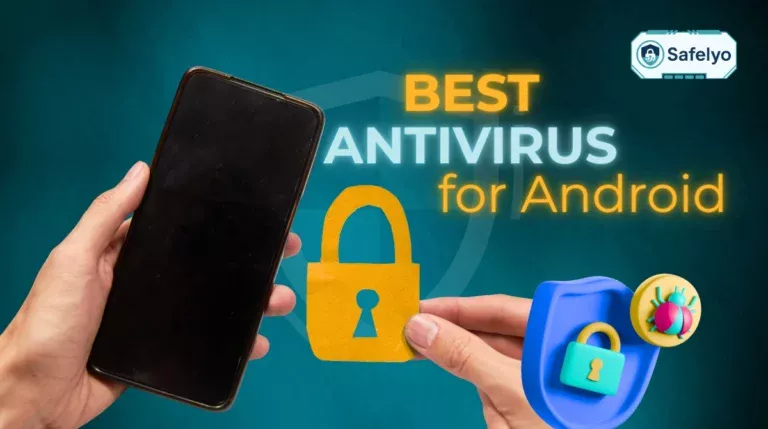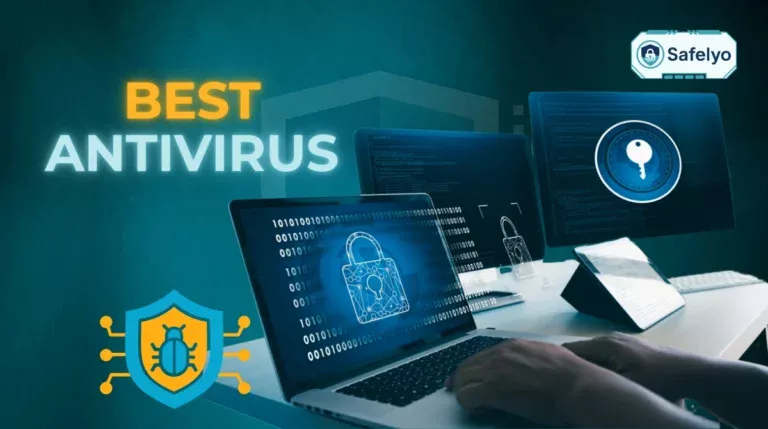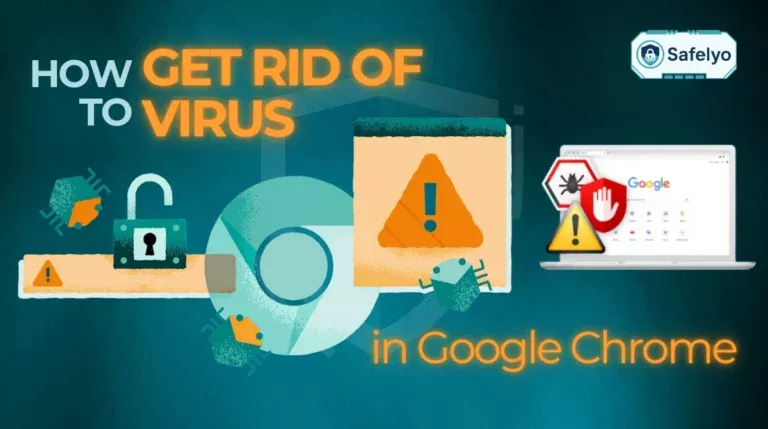Have you been tapping away at your favorite puzzle game and suddenly wondered, “Does Block Blast have a virus?” after a startling pop-up warned your phone was in danger? If so, you’re not alone – it’s a surprisingly common and jarring experience that sends many players searching for answers.
Let’s clear the air right away: the official Block Blast game itself is not a virus. The real issue, however, isn’t the game but the deceptive third-party ads it displays. This phenomenon has a name: malvertising, and it’s specifically designed to trick and scare you into taking action.
As a mobile security analyst, I’ve seen this exact scare tactic countless times. It preys on the uncertainty between a trusted app and the untrusted ad networks it uses for revenue. It’s a loophole that cybercriminals love to exploit, turning a moment of relaxation into one of panic.
In this guide, I will show you exactly what’s going on:
- The direct answer to whether Block Blast is safe.
- What “malvertising” is and why it appears in free games.
- Clear red flags to identify a malicious ad instantly.
- A simple, step-by-step action plan for when you see one.
Don’t let a deceptive ad ruin your fun or compromise your security. Let’s uncover the truth behind those alarming pop-ups and empower you to play safely.
1. Does Block Blast have a virus?
Let’s get straight to the point: No, the official ‘Block Blast Adventure: Master’ game itself is not a virus.
When you download a popular game like this from the official Apple App Store or Google Play Store, it has already gone through a security screening process. Both Apple and Google have systems in place to check apps for malicious code before they become available to millions of users. It’s in their best interest to keep their marketplaces safe.
So, where are those scary warnings coming from? The danger doesn’t lie within the game’s code but in the third-party advertising networks it uses to make money.
In my experience as a security analyst, this is the most common point of confusion. I often explain it like this: think of the game developer as the owner of a reputable shopping mall. They keep the mall itself clean and safe. However, they rent out store space to other businesses (the advertisers). While most of these businesses are legitimate, occasionally, a shady pop-up shop sneaks in and tries to scam the mall’s visitors.
The game developer isn’t intentionally showing you a virus warning; a malicious ad has simply slipped through the ad network’s filters.
To put it simply: The game is the stage, but the ads are the potentially dangerous actors. Your job is to learn how to tell the good actors from the bad ones.
2. Understanding the real culprit: What is malvertising?
Now that you know the game isn’t the problem, let’s name the real villain: malvertising. It’s a simple blend of two words: “malicious” and “advertising.” In short, malvertising is the practice where cybercriminals injecting harmful or deceptive ads into legitimate, trusted online advertising networks.
So, how does a dangerous ad end up in a harmless game like Block Blast? The process is surprisingly straightforward:
- The developer needs to make money: To keep the game free, the developers of Block Blast partner with third-party ad networks. These networks pay the developer to display ads inside their app.
- Most ads are legitimate: For the most part, these networks show you harmless commercials for other mobile games, shopping apps, or products.
- A malicious ad slips through: However, ad networks review thousands of ads every day. Cybercriminals have become experts at disguising malicious ads to look legitimate, allowing them to bypass this automated screening process.
- The harmful ad is served to you: Once approved, the malicious ad enters the rotation and is randomly displayed to players like you, resulting in that fake virus pop-up on your screen.
Over the years, I’ve had to explain this concept to many concerned friends and family members. I always compare it to a movie theater. The game developer owns the theater and makes sure the building is safe and the movie plays correctly. But they don’t produce every single commercial that runs before the film. Sometimes, a misleading or scammy commercial slips past the agency that supplies the ads. The theater owner didn’t create it, but it still plays on their screen.
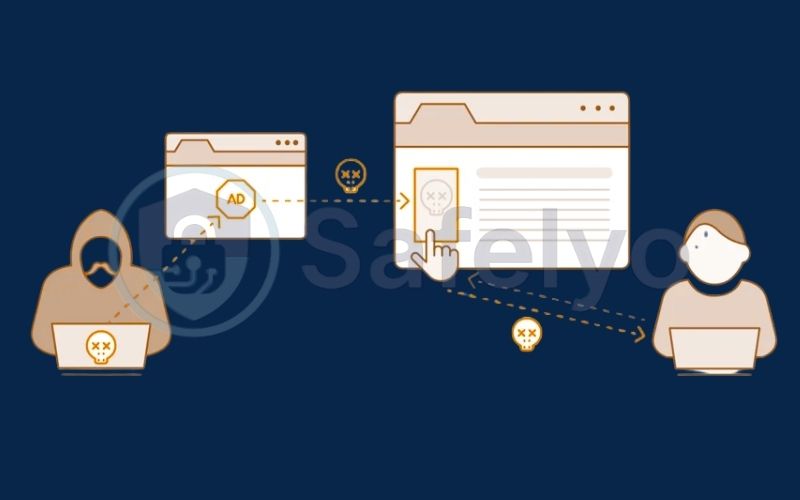
Safelyo’s Expert Insight
The Business of “Free” Apps
It’s crucial to remember that “free” apps aren’t truly free. You pay with your attention and, sometimes, your data. Developers rely heavily on these large-scale ad networks to monetize their games, but this means they often have very little direct control over the specific ads shown to each user. This creates the perfect loophole for malvertising to thrive. As a user, your best defense is always a healthy dose of skepticism.
This is precisely why a perfectly safe and fun game can sometimes show you something that feels very unsafe.
3. How to spot a malicious ad in Block Blast (and other games)
The good news is that these malicious ads are often clumsy and easy to spot once you know what to look for. Think of it like learning to identify a phishing email – once you see the patterns, you can’t unsee them. I’ve analyzed hundreds of these ads, and they almost always rely on the same cheap tricks.
Here is your checklist of the most common red flags to watch for:
Fake virus warnings
This is the number one scare tactic. You’ll see dramatic, flashing messages like, “Your phone has 17 viruses! Tap here to clean now!” Let me be crystal clear: your phone’s operating system (iOS or Android) will never, ever send you a virus alert through an ad in a puzzle game. This is always a lie.
"You've won!" messages
If an ad suddenly declares you’ve won a new iPhone, an Amazon gift card, or some other unbelievable prize, it’s a scam. This is a classic phishing attempt designed to get you to click and enter your personal information to “claim” a prize that doesn’t exist.
Urgent language and timers
Notice words like “URGENT!“, “WARNING!“, or “Act Now!” often paired with a dramatic countdown timer. This is a psychological trick designed to create a sense of panic. They want you to react emotionally and click before your rational brain has a chance to question it.
Poor grammar and design
Many of these scam ads are created quickly by non-native English speakers. Look for obvious spelling mistakes, awkward grammar, or blurry, low-quality graphics. A legitimate ad from a major company will rarely look so unprofessional.
Requests to download software
The ad might claim your phone is “slow” or “unprotected” and pressure you to install a “free virus cleaner,” a “performance booster,” or a “special VPN.” These are often Trojans in disguise – apps that appear useful but secretly contain malware.
To make it even easier, here is a simple side-by-side comparison.
Safe ad vs. malicious ad: A quick comparison
| Criteria | Safe Ad | Malicious Ad |
| Message | Promotes another product or game. | “VIRUS WARNING!”, “YOU’VE WON A PRIZE!” |
| Language | Professional and clear. | Urgent, sensational, and often has spelling errors. |
| Action | “Play Now,” “Download” (from the real App Store). | “CLEAN NOW!”, “CLAIM REWARD” (leads to a strange website). |
| Design | Usually has clear branding and looks polished. | Flashing, bright colors often look cheap or generic. |
Once you start recognizing these signs, you’ll feel much more in control of your gaming experience.
4. What to do when you see a suspicious ad
Okay, you’ve spotted an ad with all the red flags – it’s flashing, warning you about viruses, and has a big, tempting “CLEAN NOW” button. Your first instinct might be to panic or try to close it.
Stop. Take a breath. Follow these three simple steps. This is the safest way to handle the situation, a method I always recommend because it avoids any interaction with the potentially harmful ad.
Step 1: Do not tap anything.
This is the golden rule. Do not click on the ad, the “download” button, the countdown timer, or even the small “X” to close it. Cybercriminals are tricky; sometimes, that “X” isn’t a close button at all. It’s often a disguised link designed to open a malicious website in your browser the moment you tap it. The only way to win this game is not to play.
Step 2: Close the app immediately.
Instead of trying to close just the ad, force-close the entire Block Blast application. This is the digital equivalent of hanging up on a scam phone call – it ends the conversation instantly and safely.
- On a modern iPhone or Android: Simply swipe up from the bottom of your screen and pause to open the app switcher. Then, find the Block Blast app window and swipe it up and off the screen.
- On older devices with a home button: Double-press the home button to see your open apps, then swipe the game away.
Step 3: Relaunch the game.
Wait a second or two, then simply tap the Block Blast icon to open it again. The game will restart, and the ad network will serve you a brand new ad (hopefully a harmless one this time). The malicious pop-up will be gone, as it was never part of the game to begin with.
That’s it. By following this simple three-step process, you neutralize the threat without ever having to engage with it.
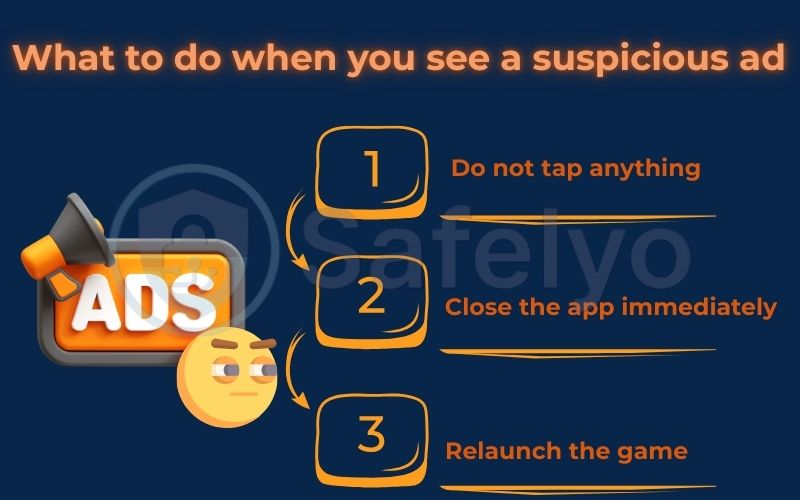
Read more:
5. Should you delete Block Blast?
After dealing with a few alarming pop-ups, it’s natural to wonder if you should just delete the game and be done with it. The answer really depends on your personal tolerance level.
For most users, deleting the game is not necessary. The game itself is still safe. Now that you know how to identify and safely dismiss malicious ads, you can continue playing without risk. You’ve learned the trick, so the scare tactics won’t work on you anymore.
However, you should consider deleting Block Blast if:
- The malicious ads appear too frequently. If you find that every other ad is a scammy pop-up, it can ruin the fun of the game. Your time and peace of mind are valuable.
- You accidentally clicked on a suspicious ad. If you’re worried you might have tapped a link or downloaded something by mistake, deleting the app is a reasonable first step before running a security check (more on that next).
Ultimately, the choice is yours. The game isn’t the enemy, but you have to decide if the entertainment it provides is worth the occasional annoyance of dodging a bad ad.
From my professional standpoint, constantly navigating these digital minefields can be exhausting. If you’re tired of dealing with risky ads and pop-ups, the best long-term solution is a mobile security app. A good antivirus app can actively block your browser from accessing malicious websites that these ads link to and scan your device for any potential threats you might have accidentally installed.
6. FAQ around whether block blast has a virus
Here are quick answers to some of the most common questions we hear about Block Blast and its safety.
Is the Block Blast app safe?
Yes, the official Block Blast game downloaded from the Apple App Store or Google Play Store is safe. The application itself does not contain a virus. The security risk comes from malicious third-party advertisements (malvertising) that can be displayed within the game.
Did my phone get a virus just from seeing the ad?
It’s extremely unlikely. Simply viewing a malicious ad is generally not enough to infect your phone. The real danger comes from interacting with it – tapping on the ad, downloading a file it offers, or entering your personal information on a website it links to.
How can I stop all ads in Block Blast?
The most reliable way is to see if the game offers an in-app purchase for an “ad-free” version. This removes all ads, both safe and malicious. Alternatively, playing the game while your phone is in airplane mode will prevent any ads from loading, as they require an internet connection.
Are there other puzzle games like this?
Yes, absolutely. Malvertising is a widespread issue that affects many free, ad-supported mobile games, not just Block Blast. The safety tips and red flags discussed in this guide can and should be applied to almost any free game you play.
Does Block Blast purposefully make you lose?
There is no evidence to suggest that the game is programmed to make you lose intentionally. Like many puzzle games, its difficulty increases over time. The block pieces are generated randomly, which can sometimes lead to impossible-to-win situations, but this is a feature of the game’s design, not a malicious attempt to force a loss.
Why did Block Blast go viral?
Block Blast went viral due to its simple, addictive, and satisfying gameplay, similar to classic games like Tetris. It’s easy to learn but challenging to master, making it appealing to a very broad audience. Its success was also amplified by aggressive social media advertising campaigns.
Is Block Blast good for you?
From a cognitive perspective, puzzle games like Block Blast can be beneficial. They can help improve spatial reasoning, problem-solving skills, and short-term memory. However, like any screen-based activity, moderation is key. The primary “unhealthy” aspect is the potential exposure to the malicious ads we’ve discussed.
7. Conclusion
So, to answer the original question one last time: does Block Blast have a virus? The game itself does not, but it serves as an unwitting platform for third-party ads that can be malicious. The real threat isn’t the app, but the deceptive pop-ups that can appear within it.
By understanding what’s really happening, you can take back control and enjoy your game without fear.
Key Takeaways to Remember:
- The game is safe; the ads are the risk. The official app from trusted stores is not a virus.
- Learn to recognize “malvertising.” Look for red flags like fake virus warnings, urgent timers, and promises of free prizes.
- If you see a suspicious ad, close the app immediately. Do not tap anything inside the ad, including the “X” button.
- You don’t need to delete the game if you know how to handle the ads safely.
Education is your best defense against online threats. By becoming a smarter, more aware user, you can enjoy your favorite free games without falling victim to the scams they might contain. For more expert guides on identifying and avoiding these dangers, explore the Antivirus Center of Safelyo.


